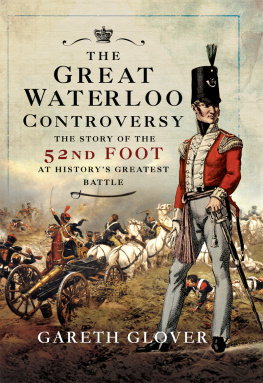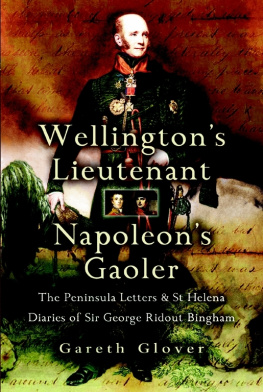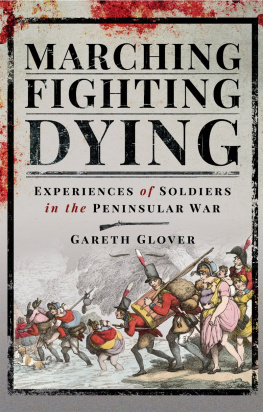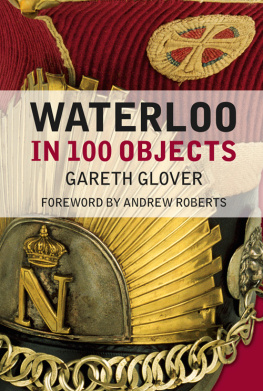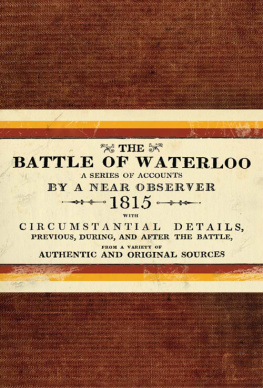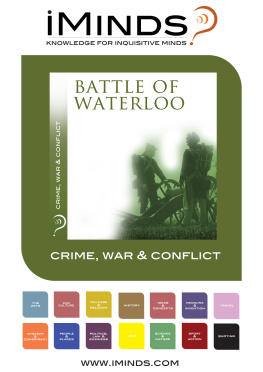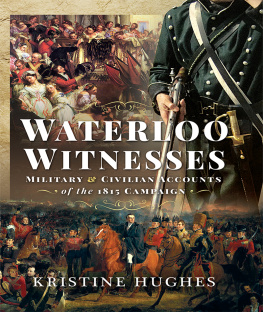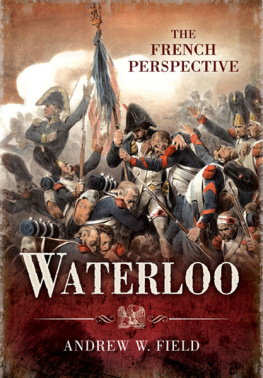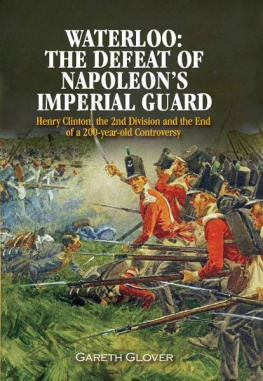Letters from the Battle of Waterloo
Unpublished Correspondence by Allied Officers from the Siborne Papers
This paperback edition published in 2018 by
Greenhill Books, c/o Pen & Sword Books Ltd,
47 Church Street, Barnsley,
South Yorkshire, S70 2AS
www.greenhillbooks.com
Copyright Gareth Glover, 2004
Foreword John Hussey, 2018
Publishing history
Letters from the Battle of Waterloo was first published in hardback in 2004 by Greenhill Books, London, under the title Letters from Waterloo: The Unpublished Correspondence by Allied Officers from the Siborne Papers . This 2018 paperback edition includes new introductory material by the author and a foreword by John Hussey.
ISBN: 978-1-78438-349-7
eISBN: 978-1-78438-350-3
Mobi ISBN: 978-1-78438-351-0
The right of Gareth Glover to be identified as the author of this work has been asserted by them in accordance with the Copyright, Designs and Patents Act 1988.
All rights reserved. No part of this publication may be reproduced, stored in or introduced into a retrieval system, or transmitted, in any form, or by any means (electronic, mechanical, photocopying, recording or otherwise) without the prior written permission of the publisher.
A CIP catalogue record for this book is available from the British Library.
FOREWORD
It should go without saying that Waterloo was a great Allied victory, with contributions of varying importance by Wellingtons British, Dutch, Belgian and German contingents and by Blchers Prussian army. The results were sufficient for the glory of many such armies as the two great Allied armies engaged. But the chance happening that Lieutenant William Siborne in 1830 was somewhat vaguely commissioned to prepare a plan and perhaps a model of the field led to unexpected consequences As the century progressed, so various Continental historians van Loben Sels, von Ollech and others produced accounts relating to the achievements of their own people, as did, of course, the defeated French from their separate angle of vision.
By the beginning of the twentieth century not only were there major histories by French, Prussian, and Dutch-Belgian authors to round out the story as told by Siborne although specialist journals continued to print occasional fresh material from time to time. But Belle-Alliance was never translated into English, and Waterloo Letters comprised only 180 letters creamed from the Siborne collection and written by 123 English, Scottish, Welsh and Irish correspondents, but among whom only one served in the KGL and one with the separate Hanoverian contingent.
At this point, a young ex-Royal Navy officer now in full-time civilian employment decided that a further selection from the Siborne papers was essential. Living far from the British Library, and in addition to his employed work and family duties, Gareth Glover patiently transcribed a further 310 letters from 230 correspondents not used by Herbert Siborne, about 30 of them by German officers, some of whom wrote several letters (only to be too-often ignored by William). Thus, in comparison with Herberts tally and purely British coverage the Glover additions were significant, and if the earlier editor skimmed much of the cream, Gareths additional material was still of great value. Moreover, he added a further 29 letters in the collection that dealt with the making of the models and certain attempts by the Prussians to influence the layout of the troops on the models; plus a summary list of letters that were not judged worth printing.
Such a magnificent achievement required endless patience and skill in its creation and a massive command of detail right down to the colour of contingents uniforms. The deciphering of scrawls was wearisome: ink was often faded, and the words sometimes only semi-legible. And it was all done in such spare time as this busy man could find.
When Letters from Waterloo was published in 2004 it was instantly recognized as a major work of scholarship. Some significant adjustments to the old story now became necessary and perhaps the most interesting was Gareths revision to the account of Major Barings defence of La Haye Sainte and the casualties suffered there. Praise was widespread: the historian Andrew Uffindell in The Journal of the Society for Army Historical Research termed it a gold mine and in the British Army Review , I wrote that Waterloo scholars must all be eternally in his debt. Gareth Glover, Letters joins the select few among Waterloo books.
But of course, that was not the end of the story, and since then Gareths name has spread from a single book to a shelf of over a dozen major contributions (plus some 50 smaller ones), separate finds such as the Clinton correspondence or James Stanhopes journals that hitherto only Fortescue seems to have studied. Moreover, there are the six important volumes of The Waterloo Archive (201014), which add many new Allied


